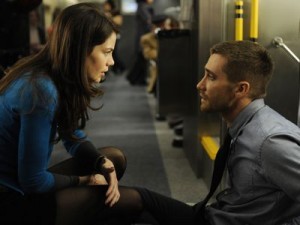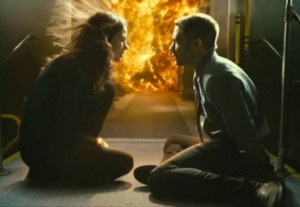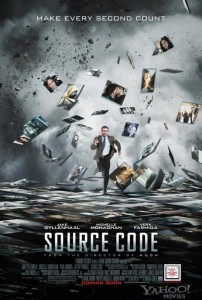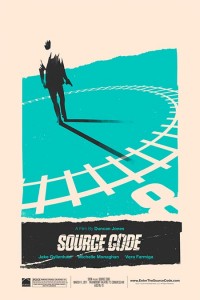Much like a film that stars only a single human character on a lunar base (even if he’s played by Sam Rockwell, and there are several of him), there are a great number of pitfalls that could cripple a film which repeats the same 8 minutes in the same location. Fortunately with Source Code, Duncan Jones tackled those issues with class, demonstrating that Moon was no fluke and that a sophisticated and valuable filmmaker is developing in front of our eyes.
Directing a script by Ben Ripley, Jones brings his restrained but dynamic visual style and keen eye for performance to a story about a military helicopter pilot who finds himself repeating the same 8 minute simulation, under the supervision of a pair of military scientists who are unwilling to reveal much information to the semi-amnesic airman. He finds himself in another man’s body and forced to relive the last few moments on a train before an explosive terrorist attack, and in between these “sessions” he is trapped in a mysterious capsule. Here you have the set-up for a twist-based, episodic techno-thriller that Jones and Ripley managed to turn into something more thoughtful, creative, and entertaining than any bland Tony Scott-leftovers-style trailer could ever indicate.
There are two things you should know about Source Code: it’s funny, and it’s not a twist film. The humor comes from the excellent performance from Jake Gyllenhaal, who delivers his most diverse and entertaining turn yet. This script calls for him to embody amnesic confusion, military discipline, and a wide-range of emotional stuffs inbetween, and the actor is up to the challenge. Impressively, he does all of this while still centering the character as a sharply humorous and generally charming guy- this tiniest hint of Carey Grant accentuates the strong wafts of Hitchcock that permeate the film itself.
Gyllenhaal dives into every emotional demand with great energy, and this is evident nowhere more than when Stevens is being questioned and prompted by Vera Farmiga’s character after the first simulation we see. He is baffled and confused by his unfamiliar surroundings, overwhelmed by the scenario he has just run through, growing increasingly frustrated with his questions being ignored, and is simultaneously responding to prompts in a instinctive, patterned way that only furthers confuses him. How does he know the answer to these questions? What the hell is happening to me? Where am I? All of these questions register on his face, and makes a strange opening and conceptual set-up more easily swallowed by a similarly confused audience.
The conceptual, philosophical, and technological structure of the film is where you would likely expect a “twist” of some sort or perhaps a thin “military experiment” explanation for what’s going on. Somehow Source Code simultaneously delivers more and less information about what’s going on than you would expect, and its surprises are delivered midway through the film, rather than as “gotcha” moments towards the end. Like a number of good films lately (Moon being one of them, Shutter Island being another (different kind of) example), paradigm shifts are presented early in the film, which allows them to simmer in a viewer’s mind, and relieves you of the obligation of spending the whole film guessing how things work. It also lets the film weave thematic elements in with the shift, creating a stronger ending payoff. Aside from the good timing though, the explanation for the repeating train scenario is clever and acknowledges enough real science to be bought, and it inherently raises some philosophical and quantum mechanics questions that will provide for some good conversation with your pals as you leave the theater. It resembles Primer in its use of plausible advanced science to explain implausible events, though with a much less intimidating use of jargon.
 Vera Farmiga, Jeffrey Wright, and Michelle Monaghan make up a sharp supporting cast that all do great work in a film that would be conceptually limiting for lesser actors. Monaghan is in the same boat as Gyllenhaal, forced to react to several dozen examples of bizarre behavior from someone she knows. I can only imagine the difficulty in coming up with 40 or 50 different ways of interpreting confusion and shock, but she pulls it off. She’s benefited by Jone’s wise choice to give each scene a hint of variation, which plays into the larger conceptual construct in a way I won’t spoil. Wright and Farmiga especially often find themselves acting in limiting circumstances (read: into a webcam), but even when compressed to flat images within images they both manage to pull off strong, distinctive performances. Farmiga is faced with the task of growing to care for Colter Stevens in a very short timeframe –a tough job actresses are often saddled with– and she eases the character to that place remarkably. It also doesn’t hurt that she has a wonderful face that belongs on every screen lucky enough to host it, webcam or no. Wright takes what could be a typical “unfeeling scientist” role and uses some very subtle cues to inject humanity and antagonism into a character that is by no means resoundingly evil and by no means perfectly righteous.
Vera Farmiga, Jeffrey Wright, and Michelle Monaghan make up a sharp supporting cast that all do great work in a film that would be conceptually limiting for lesser actors. Monaghan is in the same boat as Gyllenhaal, forced to react to several dozen examples of bizarre behavior from someone she knows. I can only imagine the difficulty in coming up with 40 or 50 different ways of interpreting confusion and shock, but she pulls it off. She’s benefited by Jone’s wise choice to give each scene a hint of variation, which plays into the larger conceptual construct in a way I won’t spoil. Wright and Farmiga especially often find themselves acting in limiting circumstances (read: into a webcam), but even when compressed to flat images within images they both manage to pull off strong, distinctive performances. Farmiga is faced with the task of growing to care for Colter Stevens in a very short timeframe –a tough job actresses are often saddled with– and she eases the character to that place remarkably. It also doesn’t hurt that she has a wonderful face that belongs on every screen lucky enough to host it, webcam or no. Wright takes what could be a typical “unfeeling scientist” role and uses some very subtle cues to inject humanity and antagonism into a character that is by no means resoundingly evil and by no means perfectly righteous.
It’s arguable that Source Code makes some questionable decision in its third act, as it resolves its unique storyline in a multi-layered manner that does skate over a few logic problems, and forces itself to hit some romantic notes that can ring a little cheesy. That said, there’s nothing unearned about the conclusion and pay-off of Source Code, so even where it gets a little loose, it’s easily forgiven. However, there is an unquantifiable element that makes the movie feel lighter than I think it is. Source Code raises profound questions, manages a terribly difficult conceit, boasts great performances, and is consistently dynamic, and yet it just doesn’t cross that unknowable finish line that seals it as a classic. I considered that it was perhaps the humor that sold it short, but I can’t imagine the film without that charm, and a more dour tone would have surely made it a slog. Whatever it is, it doesn’t change the fact that it is a hell of a film, and one you should catch at earliest opportunity. Assuming Jones has a long career, Source Code will ultimately be remembered as an early-career promise of talent rather than a oeuvre highlight, but if this his version of a studio “one for them” movie, then we can keep looking forward to his more commercial work right along with the personal stuff.
Rating: 




Out of a Possible 5 Stars
Q&A Highlights
After the SXSW screening of source code, we were lucky enough to be joined by director Duncan Jones, writer Ben Ripley, as well as the full principle cast (save for Jeffrey Wright). Everyone was wonderful to hear speak, my long-time crush on Vera Farmiga was instantly rekindled, and apparently Jake Gyllenhaal nearly took out some dude later in the night when the asshole tried to snap a picture of him pissing. All told, a successful world premiere for the film. I nabbed a few choice quotes from the Q&A that I thought I’d share with you. After a truly retarded question that tried to connect the film to Donnie Darko (Gyllenhaal’s response: “Um… what?” before mustering something more polite), there were some solid questions that netted great responses…
On how Duncan got involved in the project…
Jones: I went and met Jake in LA to discuss a film that I’ve been trying to make forever [hmmm, whatever could that be?], and he said, “You know that sounds really fascinating! One day we might be able to do that, but right now take a look this…” and he gave me the Source Code script, so that’s how I got interested.
 On the “source” for the Source Code idea…
On the “source” for the Source Code idea…
Ripley: This was a really tortuous process for me to write this. I was thinking about movies like Rashomon and Groundhog Day and Sliding Doors [laughter], and eventually found my way to the train, and eventually found my way to the terrorism plot. And I dunno, I wish I could take a pill and do it all again. I think it was trying to channel a non-linear story like Rashomon, that’s all I can tell ya.
On how much computer science research went into the script…
Ripley: I knew a little bit about theoretical physics, in terms of time travel not being possible but parallel universes being possible, so that always intrigued me. And I’ve never seen a time travel movie that wasn’t about changing the past [I think he means “was”], which is what Colter wants to do the entire movie, is change the past. The early drafts I wrote had a lot more science and a lot more explanation- you saw more technology, and what we found is that by stripping that out, by stripping out the explanations everything became more believable, because everyone just sort of accepted it. [Laughter]
On the significance of the Chesney Hawks song (The One And Only) that Jones also used on the alarm clock (in Moon)…
Gyllenhaal: [Duncan] was desperately trying to make the seats British flags on the train, that was his goal, and the only way he could get a bit of his British culture into the movie, was to put that song on the phone, that’s my theory. [laughter]
 Jones: That’s really not true. In fact, originally Jake was insisting that song play every time he was on screen, but I said, “you know, that might get a bit old, because you’re on screen a lot.” So we went for the phone instead. It was the exact same piece of music [used for the alarm clock in Moon]. Chesny is a friend of mine and I remember that piece of music when I was young, and it was just sort of one of those things. It’s kind of an inside joke for British people but- it was kind of a one-hit wonder and a piece of music in the UK that everyone knows where they were when it came out.
Jones: That’s really not true. In fact, originally Jake was insisting that song play every time he was on screen, but I said, “you know, that might get a bit old, because you’re on screen a lot.” So we went for the phone instead. It was the exact same piece of music [used for the alarm clock in Moon]. Chesny is a friend of mine and I remember that piece of music when I was young, and it was just sort of one of those things. It’s kind of an inside joke for British people but- it was kind of a one-hit wonder and a piece of music in the UK that everyone knows where they were when it came out.
On the difficult of keeping track during filming, of each individual time-shift…
Gyllenhaal: It was very important to use from the very beginning to make sure there was variation. Eventually we set up a system we could sort of subtly take apart. There’s… in the third source code Michelle has her arm up when you meet her for the first time, and then Duncan decided he wanted to shoot the fourth and fifth ones a different way, and enter a different way, and so there was always a since of variation and the knowledge that if we didn’t vary it, you would lose… something. The repetition would just becomes…
Jones: We basically said it was very very important right from the start, I think for all of us, you kind of know this can go one of two ways. You can either repeat the same event again and again and bore the audience to tears, or you find a way to differentiate ever one of those revisits, and that’s not just narratively- that’s visually, and even performance-wise. I think there are nuances and things that Jake was doing differently that gave Michelle different things to react to. I think there’s the ongoing arc of the story between Vera and Jake and their relationship over the whole course of the film, so everything has a structure and a change that arcs over the entire period of the film’s story.
Gyllenhaal: We were also so tense most of the time that we were getting everything right that I think it added to each day and regardless of what you’re doing over and over again, “Did we get- did we get that? Did you make sure that- Did he- Did we- Did I do that? Yeah, you got it. You sure? Yeah, I think so. You think so? What do you mean you think so?” You know it was everyday like that, so there was tension that was inherent to making sure all the details were gotten and that I gave him everything he needed to cut together the film.
DISCUSS THIS on the CHUD Message Board or in the comments,
&
Like / Share it on Facebook (above or below) if you think it’s great!
